CBC
Sat, February 17, 2024
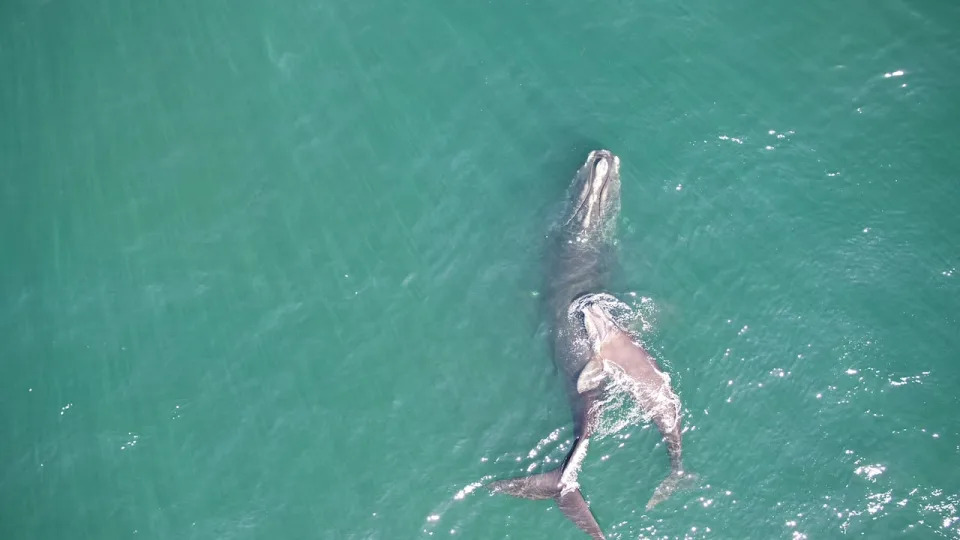
Mother and calf together in spring 2023 in Cape Cod, Mass. The calf was killed by a ship, according to necropsy results released Friday evening.
(New England Aquarium/Woods Hole Oceanographic Institution, taken under NOAA permit #21371 - image credit)
A young North Atlantic right whale found dead off the coast of Georgia this week was killed by a ship, according to necropsy results released Friday evening.
The National Oceanic and Atmospheric Administration (NOAA) confirmed in an update that a necropsy performed on the whale on Feb. 15 revealed skull fractures and other blunt force injuries consistent with a vessel strike.
The calf was just over a year old and was first seen off the coast of Florida in December 2022. Gib Brogan, campaign director at the ocean conservation organization Oceana, said she was seen swimming with her mother as recently as 10 days ago.
"A tragic outcome for this whale, particularly because it's a female," said Brogan in an interview with CBC's Shift.
"She represents not just herself but all of her calves and grand calves that she could have produced to help this species come back."
Second whale to die this year
A news release from the New England Aquarium states that the yearling is the second young right whale to have suffered a vessel strike in the last six weeks. A newborn calf was seen with severe propeller wounds off the southeast U.S. in early January.
Another young female right whale also washed up dead on Martha's Vineyard on Jan. 28. The New England Aquarium release states that a preliminary necropsy showed chronic entanglement, with rope that has been linked to Maine's lobster fishery "deeply embedded" in the whale's tail.
Brogan said the female whales are critical for the survival of the critically endangered species. There are only 70 breeding females remaining in a population of less than 360.
He said boat strikes or entanglement in fishing gear are the most common causes of death for North Atlantic right whales.
"No right whales are dying from natural causes," he said.
"We know that more needs to be done in the United States to reduce the risk of entanglement. Unfortunately, it took this whale to show us that we need management attention in Maine waters."
Changes to fishing gear, vessel speed limits, face delays in U.S.
He said the Canadian government has taken effective steps to protect North Atlantic right whales, citing measures such as speed restrictions for vessels in the Gulf of St. Lawrence during seasons when whales are active in the area.
Brogan said the U.S. government isn't doing enough to protect the species, noting that a group of lawmakers inserted a rider to a funding bill in 2022 that prevents the implementation of new restrictions on fishing rope until 2029.
"When every death of a whale sets the recovery of the species back more than a year, it is important that we do everything we can," said Brogan.
A young North Atlantic right whale found dead off the coast of Georgia this week was killed by a ship, according to necropsy results released Friday evening.
The National Oceanic and Atmospheric Administration (NOAA) confirmed in an update that a necropsy performed on the whale on Feb. 15 revealed skull fractures and other blunt force injuries consistent with a vessel strike.
The calf was just over a year old and was first seen off the coast of Florida in December 2022. Gib Brogan, campaign director at the ocean conservation organization Oceana, said she was seen swimming with her mother as recently as 10 days ago.
"A tragic outcome for this whale, particularly because it's a female," said Brogan in an interview with CBC's Shift.
"She represents not just herself but all of her calves and grand calves that she could have produced to help this species come back."
Second whale to die this year
A news release from the New England Aquarium states that the yearling is the second young right whale to have suffered a vessel strike in the last six weeks. A newborn calf was seen with severe propeller wounds off the southeast U.S. in early January.
Another young female right whale also washed up dead on Martha's Vineyard on Jan. 28. The New England Aquarium release states that a preliminary necropsy showed chronic entanglement, with rope that has been linked to Maine's lobster fishery "deeply embedded" in the whale's tail.
Brogan said the female whales are critical for the survival of the critically endangered species. There are only 70 breeding females remaining in a population of less than 360.
He said boat strikes or entanglement in fishing gear are the most common causes of death for North Atlantic right whales.
"No right whales are dying from natural causes," he said.
"We know that more needs to be done in the United States to reduce the risk of entanglement. Unfortunately, it took this whale to show us that we need management attention in Maine waters."
Changes to fishing gear, vessel speed limits, face delays in U.S.
He said the Canadian government has taken effective steps to protect North Atlantic right whales, citing measures such as speed restrictions for vessels in the Gulf of St. Lawrence during seasons when whales are active in the area.
Brogan said the U.S. government isn't doing enough to protect the species, noting that a group of lawmakers inserted a rider to a funding bill in 2022 that prevents the implementation of new restrictions on fishing rope until 2029.
"When every death of a whale sets the recovery of the species back more than a year, it is important that we do everything we can," said Brogan.
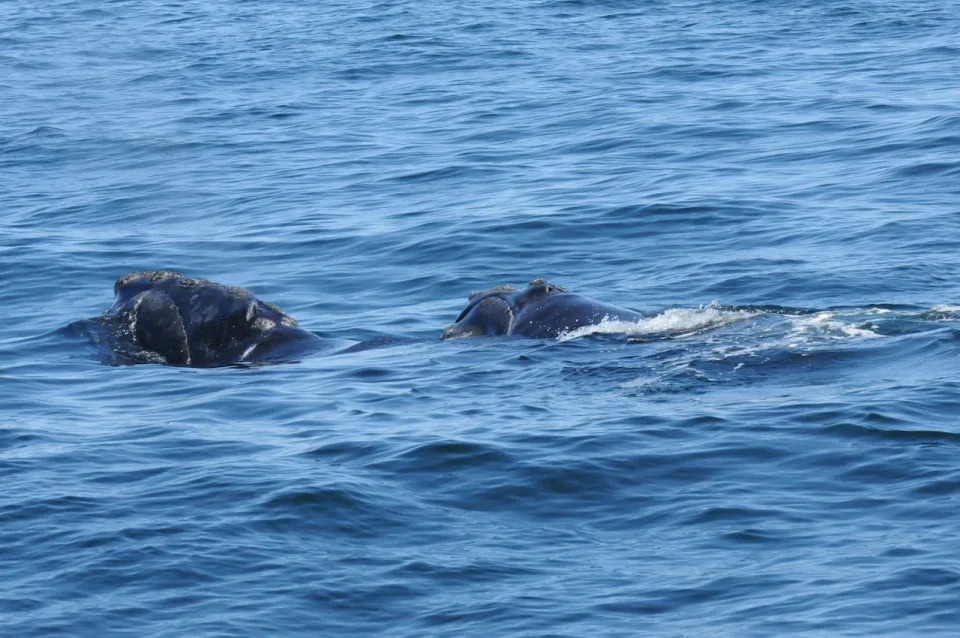
Two North Atlantic right whales are seen in Cape Cod, Mass., in spring 2023.
A necropsy performed on the whale, seen here in the spring of 2023, revealed skull fractures and other blunt force injuries consistent with a vessel strike.
(New England Aquarium/Woods Hole Oceanographic Institution, taken under NOAA permit #21371)
"To have a block by the US Congress is frustrating and will have potentially disastrous consequences for the species."
Dr. Jessica Redfern of the New England Aquarium said in Friday's news release that the vessel strikes on two young whales in the last month are "devastating" for the critically endangered species.
She called on NOAA to implement changes to vessel speed rules that were proposed more than 18 months ago but haven't been finalized.
"Finalizing this rule and expediting the broad adoption of on-demand (i.e. ropeless) fishing gear are urgently needed to prevent the extinction of this species," she said.
"To have a block by the US Congress is frustrating and will have potentially disastrous consequences for the species."
Dr. Jessica Redfern of the New England Aquarium said in Friday's news release that the vessel strikes on two young whales in the last month are "devastating" for the critically endangered species.
She called on NOAA to implement changes to vessel speed rules that were proposed more than 18 months ago but haven't been finalized.
"Finalizing this rule and expediting the broad adoption of on-demand (i.e. ropeless) fishing gear are urgently needed to prevent the extinction of this species," she said.
A basking shark has washed up in Grand Manan. Experts say it is a rarity in winter
CBC
Sun, February 18, 2024
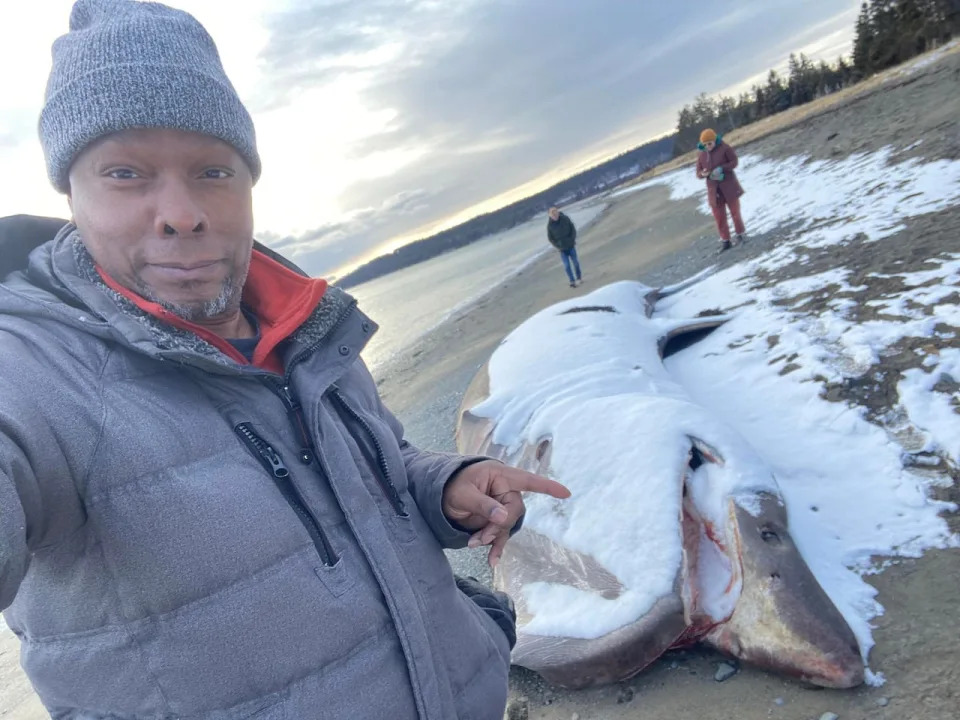
Photographer Gary Weekes said the sight of a 7.6-metre basking shark is something he’d never experienced. (Gary Weekes - image credit)
An unusual find on the southeast shore of Grand Manan Island is attracting the attention of locals and visitors.
A 7.6-metre basking shark washed up on the island's shore earlier this month.
Island resident Debbie Bath first came across the carcass while out for her evening walk.
"Just very surprised," said Bath of her reaction. "We didn't realize what it was until we got up to it and then it was the initial, 'Wow, this is a very large fish.'"
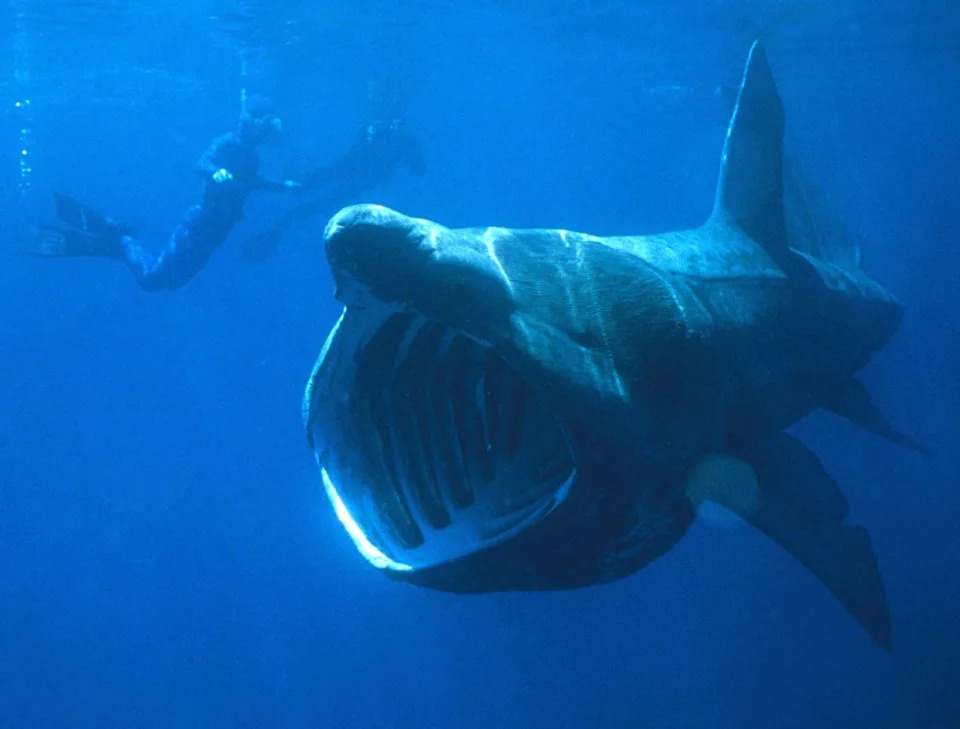
Basking sharks are very large and use their gaping mouths to feed on tiny plankton at the surface of the water, as seen in this undated photo with human divers.
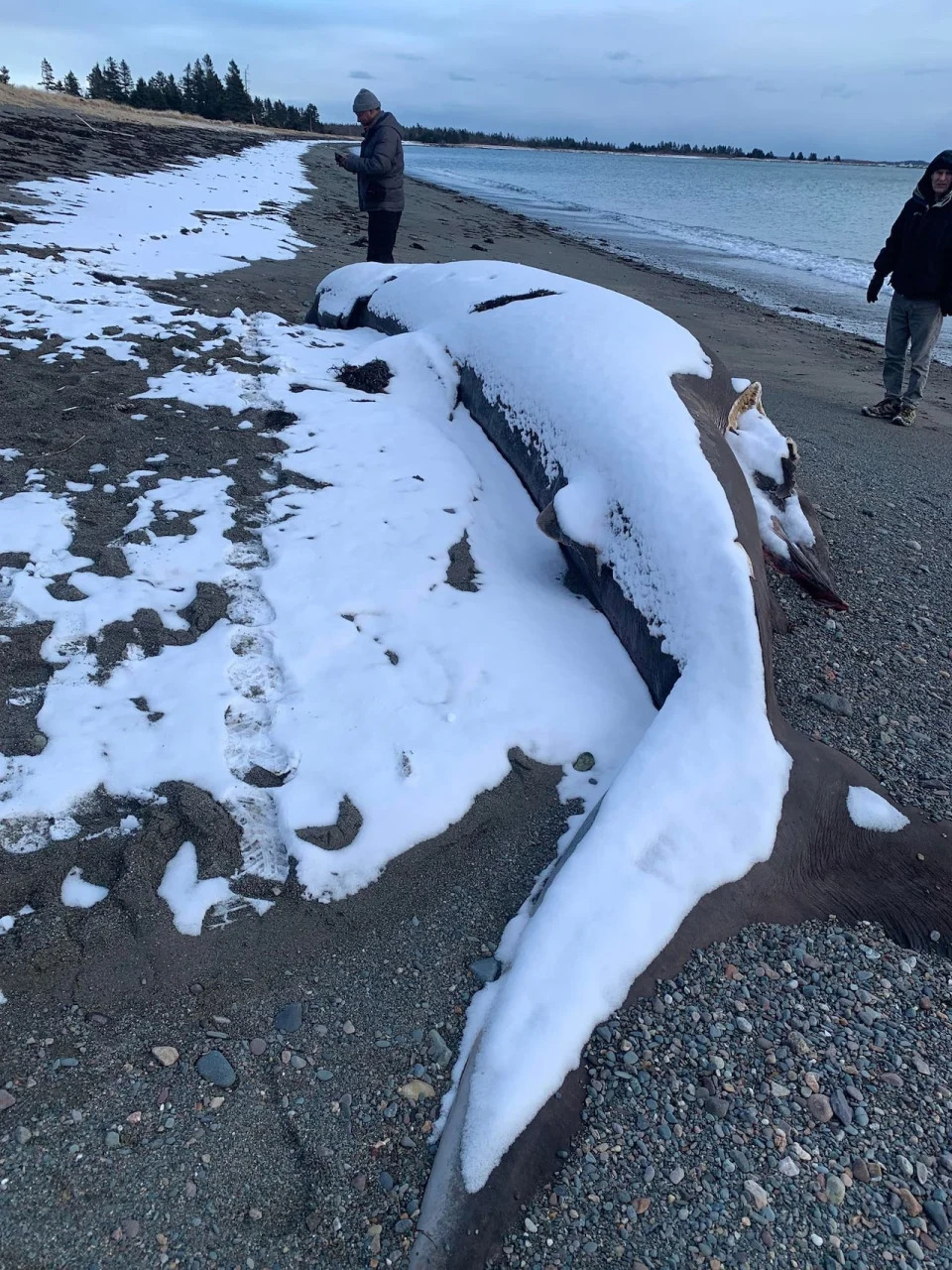
“It looks like a boulder on the beach. Didn't look like a shark from 20 feet away,” said filmmaker Catherine D’Aoust.
(Catherine D’Aoust)
Westgate said he can't say why the shark was in the area in February without an examination. But he said the shark appears to have been underfed, which could indicate a larger issue.
"[It could] indicate that the shark … basically starved to death," said Westgate.
Leavitt said if anyone encounters a beached shark, they should contact the Department of Fisheries and Oceans.
"Samples that could be taken are important research tools," said Leavitt.
CBC
Sun, February 18, 2024

Photographer Gary Weekes said the sight of a 7.6-metre basking shark is something he’d never experienced. (Gary Weekes - image credit)
An unusual find on the southeast shore of Grand Manan Island is attracting the attention of locals and visitors.
A 7.6-metre basking shark washed up on the island's shore earlier this month.
Island resident Debbie Bath first came across the carcass while out for her evening walk.
"Just very surprised," said Bath of her reaction. "We didn't realize what it was until we got up to it and then it was the initial, 'Wow, this is a very large fish.'"

Basking sharks are very large and use their gaping mouths to feed on tiny plankton at the surface of the water, as seen in this undated photo with human divers.
(Chris Gotschalk)
Filmmaker Catherine D'Aoust, who was on the island making a documentary, said she was unprepared for the size of the shark.
"It looks like a boulder on the beach," said D'Aoust. "Didn't look like a shark from 20 feet away."
Photographer Gary Weekes, who is working with D'Aoust, was also impressed by the sight of the animal.
Originally from London, England, he'd never seen a shark up close before. "When I heard about this … I thought it would be essential that we took time out [to see the shark]."
Unusual timing
While the breed of shark isn't a rarity in the Bay of Fundy, it's unusual for the animal to be in the area in the winter, experts say.
"They're usually here through the summer and fall months, so February is a little bit late for them to be here in this area," said Nicole Leavitt, senior marine biologist for St. Andrew's Sport Fishing Co. and Island Quest Whale Watching.
Andrew Westgate, senior scientist with the Grand Manan Whale and Seabird Research Station, said: "I've never heard of a basking shark washing up in the winter time."
Filmmaker Catherine D'Aoust, who was on the island making a documentary, said she was unprepared for the size of the shark.
"It looks like a boulder on the beach," said D'Aoust. "Didn't look like a shark from 20 feet away."
Photographer Gary Weekes, who is working with D'Aoust, was also impressed by the sight of the animal.
Originally from London, England, he'd never seen a shark up close before. "When I heard about this … I thought it would be essential that we took time out [to see the shark]."
Unusual timing
While the breed of shark isn't a rarity in the Bay of Fundy, it's unusual for the animal to be in the area in the winter, experts say.
"They're usually here through the summer and fall months, so February is a little bit late for them to be here in this area," said Nicole Leavitt, senior marine biologist for St. Andrew's Sport Fishing Co. and Island Quest Whale Watching.
Andrew Westgate, senior scientist with the Grand Manan Whale and Seabird Research Station, said: "I've never heard of a basking shark washing up in the winter time."

“It looks like a boulder on the beach. Didn't look like a shark from 20 feet away,” said filmmaker Catherine D’Aoust.
(Catherine D’Aoust)
Westgate said he can't say why the shark was in the area in February without an examination. But he said the shark appears to have been underfed, which could indicate a larger issue.
"[It could] indicate that the shark … basically starved to death," said Westgate.
Leavitt said if anyone encounters a beached shark, they should contact the Department of Fisheries and Oceans.
"Samples that could be taken are important research tools," said Leavitt.
No comments:
Post a Comment